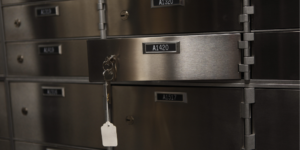We all have valuable and sentimental items that we want to protect. For securing smaller objects and documents, a safe deposit box is often the most convenient solution. When deciding whether to store something inside a safe deposit box, there are many factors to consider about your items. Some might believe the bank is the safest or most trusted place for these valuables, but a quick look at the facts shows a lot of problems with these bank services and provides us with an alternative solution.
Accessibility Issues
Safe deposit boxes are secure storage boxes that you can rent at a local bank, and they are kept in a vault. The bank offers a level of security that a private residence can’t offer, the downside is that you have limited accessibility to your deposit box because it’s only accessible during the banks business hours. Banks are closed on evenings, weekends, and major holiday. So items that you need at a moment’s notice or in an emergency probably shouldn’t be stored at a bank.
Safety Risks
The contents of a safe deposit box are rarely insured. Unless you purchase a separate policy from a third-party insurer or add a rider to your homeowner’s policy (which is very pricey), the bank won’t take the liability. The FDIC, which covers deposits at federally insured financial institutions if they fail, will insure some federal bank accounts, it does not insure the contents of a safe deposit box.
Another concern with banks is that they are susceptible to hacks, these have occurred to multiple financial institutions recently; criminal hackers infiltrated the computer systems of banks and other businesses and stole the personal information and credit card information of their customers.
There have also been cases of Banks stealing valuables. Three different Bank of America customers were blindsided when the bank drilled and emptied their safe deposit boxes without their permission or the required notice. When the Bank removed their valuables, they destroyed the documents and sold the valuables at auction. The bank even lost or damaged tens of thousands of dollars worth of property that was removed from those boxes. With your life savings and most valuable possessions at stake, this is probably a risk that you don’t want to take.
The U.S. Department of Homeland Security is allowed to obtain a warrant to access your safe deposit box for any reason that they feel is justified. For example, if the bank reports any ‘suspicious activity’ or events of that nature (i.e. too many regular visits, etc.) The IRS is also able to freeze assets merely based on suspicion of probabilities. Sometimes the greatest threat to your valuables is the financial institutions you entrusted them to. However, if you were to store your valuables in a private vault, you wouldn’t have to worry about it being regulated or audited.
Banks Taking Advantage of their Customers
Regardless of their benefits and safety nets, and “good intentions”, a banks ultimate goal is to generate profits, which means they want your money. The contrast, is that you also want to keep as much of your money as humanly possible. This brings up a conflict of interest in many cases that frequently results in banks making not completely legal or ethical decisions with their company, and with your money. Some classic examples of banks taking advantage of us as consumers include:
- Not paying the rewards that are promised in their contracts
- Increasing the amount of cash that we have to pay based on poor credit scores
- Hiking up interest rates
- Taking 5 days to wire transfer ‘your’ money
- Creating accounts in customers names
- Massive overdraft fees,
- Not exactly legal late fees
- Maintenance fees
- Minimum balance fees
- ATM fees, made up fees
- Basically, they charge you fees for breathing and existing.
Why Safe Haven Vaults is the best place for your valuables
Safe Haven Vaults is the most secure and private place for your valuables. You have complete access to your valuables whenever you want, and you are never regulated for doing so. At Safe Haven, you have full access to your valuables 24 hours a day, 7 days a week, 365 days a year. Your personal information is inaccessible to hackers because Safe Haven Vaults does not obtain or keep track of any of your personal information. You don’t have to give ID, SSN, Credit Card, you don’t even have to give them your name. The only record that Safe Haven Vaults keeps is your iris scan for you to access the building; which is kept encrypted on their off-grid servers. Safe haven also offers FULL insurance to all of your valuables at an affordable price, they even insure cash! So, you never have to worry about anything happening to your precious items. Safe Haven’s security has taken the best features from numbers of facilities throughout the U.S. and combined them with the most advanced camera and security system on the market. This includes retina scans, bulletproof windows, vibration sensors, ballistic-grade steel walls, 30 cameras, and armed guards.
All in all, some of your items are irreplaceable, so don’t risk leaving your valuables anywhere besides a place that you can truly trust to be your Safe Haven.
togel online
slot resmi
slot gacor
toto togel
link togel
situs toto
slot gacor
togel online
slot gacor
toto togel
situs sbobet
situs hk pools
slot gacor



